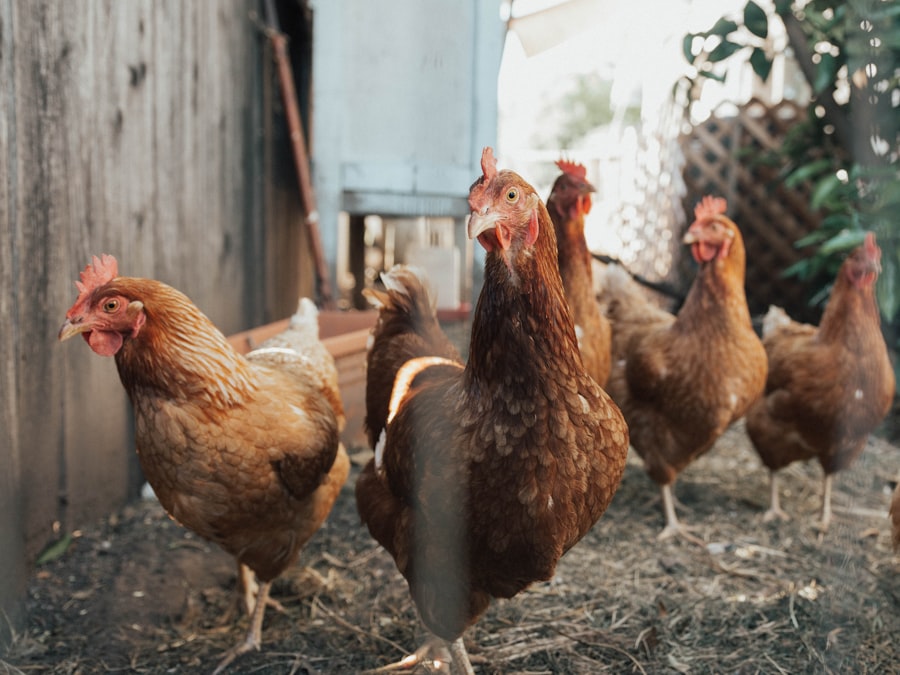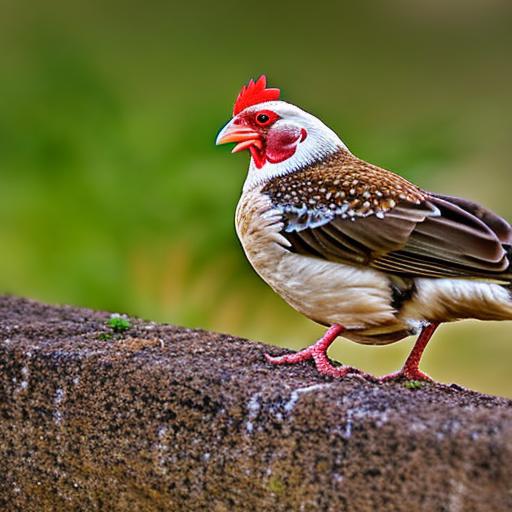Keeping chickens in your backyard has become a popular trend in recent years, and for good reason. Not only do chickens provide fresh eggs on a daily basis, but they also offer natural pest control and can be a source of entertainment and companionship. Whether you live in a rural area or a suburban neighborhood, raising chickens can be a rewarding and enjoyable experience. In this article, we will explore the various aspects of keeping chickens in your backyard, from legal considerations to building a chicken coop and maintaining a healthy flock.
Key Takeaways
- Keeping chickens in Fulton, TX requires compliance with local laws and regulations
- Choosing the right breed of chicken depends on factors such as egg production and temperament
- Building a chicken coop requires understanding basic construction principles and planning ahead
- Materials needed for building a chicken coop include lumber, wire mesh, and roofing materials
- Maintaining a clean and healthy chicken coop involves regular cleaning and proper ventilation
- Providing proper nutrition and preventing common health issues are key to keeping chickens thriving in your backyard.
Legal considerations for keeping chickens in Fulton, TX
Before embarking on your backyard chicken adventure, it is important to familiarize yourself with the local laws and regulations regarding chicken keeping in Fulton, T
While some areas may have restrictions or require permits for keeping chickens, others may have no regulations at all. It is crucial to check with your local government or zoning department to ensure that you are in compliance with any rules or restrictions that may be in place.
In Fulton, TX, there are specific regulations regarding the number of chickens allowed per property, as well as guidelines for coop placement and maintenance. For example, the city allows up to six hens per property but prohibits roosters due to noise concerns. Additionally, coops must be located at least 25 feet from any neighboring dwelling and must be kept clean and odor-free.
To find out more information about the specific regulations in Fulton, TX, you can visit the city’s official website or contact the zoning department directly. They will be able to provide you with the most up-to-date information and answer any questions you may have.
Choosing the right breed of chicken for your backyard
When it comes to choosing the right breed of chicken for your backyard flock, there are several factors to consider. Different breeds have different characteristics and temperaments, so it is important to choose a breed that aligns with your needs and preferences.
Some popular backyard chicken breeds include Rhode Island Reds, Plymouth Rocks, and Leghorns. These breeds are known for their egg-laying abilities and adaptability to various climates. If you are looking for a breed that is friendly and good with children, consider the Orpington or Sussex breeds. On the other hand, if you are interested in raising chickens for meat, breeds such as Cornish Cross or Freedom Rangers may be more suitable.
It is also important to consider the size of your backyard and the space available for your chickens. Some breeds are more suited to confinement and do well in smaller spaces, while others require more room to roam. Additionally, consider the climate in your area and choose a breed that is well-suited to the local weather conditions.
Building a chicken coop: Understanding the basics
A chicken coop is an essential component of backyard chicken keeping. It provides shelter, protection from predators, and a safe place for your chickens to lay their eggs. When building a chicken coop, it is important to understand the basics and ensure that it meets the needs of your flock.
The basic components of a chicken coop include a sturdy frame, walls, a roof, windows or vents for ventilation, nesting boxes for egg-laying, and perches for roosting. The size of the coop will depend on the number of chickens you plan to keep, but as a general rule of thumb, each chicken should have at least 4 square feet of space inside the coop.
There are several different types of coops to choose from, including traditional wooden coops, mobile coops (also known as chicken tractors), and converted sheds or outbuildings. Each type has its own pros and cons, so it is important to consider factors such as ease of access, portability, and aesthetics when deciding which type of coop is right for you.
Chicken coop planning: What to consider before building

Before you start building your chicken coop, it is important to carefully plan and consider several factors. This will ensure that your coop meets the needs of your flock and is functional and efficient.
First and foremost, consider the location of your coop. It should be situated in an area that is well-drained and provides protection from the elements, such as wind and rain. Additionally, the coop should be easily accessible for cleaning and maintenance.
The size of your coop is another important consideration. As mentioned earlier, each chicken should have at least 4 square feet of space inside the coop. However, it is always better to err on the side of caution and provide more space if possible. This will help prevent overcrowding and reduce the risk of disease or aggression among your flock.
Ventilation is also crucial for a healthy chicken coop. Good airflow will help prevent the buildup of moisture and ammonia from chicken waste, which can lead to respiratory issues. Windows or vents should be strategically placed to allow for proper air circulation without creating drafts.
Materials needed for building a chicken coop
When it comes to building a chicken coop, there are several materials that you will need. These include lumber for the frame and walls, plywood or metal roofing for the roof, wire mesh for windows and vents, hardware cloth for predator protection, and various tools such as a saw, drill, and hammer.
It is important to choose high-quality materials that are durable and weather-resistant. Pressure-treated lumber is a popular choice for the frame and walls, as it is resistant to rot and insect damage. Plywood or metal roofing will provide protection from the elements, while wire mesh and hardware cloth will keep predators out.
Sourcing affordable materials can be a challenge, but there are several options available. Consider checking local classified ads or online marketplaces for used materials that are still in good condition. Additionally, some home improvement stores offer discounts or sales on lumber and other building materials.
Step-by-step guide to building a chicken coop
Now that you have a good understanding of the basics and have gathered all the necessary materials, it’s time to start building your chicken coop. Follow this step-by-step guide to ensure a successful construction process:
1. Start by measuring and marking out the dimensions of your coop on the ground. Use stakes and string to create a visual outline of where the walls will be.
2. Dig post holes for the corners of the coop and set the corner posts in concrete. This will provide stability and prevent the coop from shifting or collapsing.
3. Once the corner posts are set, attach the horizontal frame pieces to create the walls of the coop. Use screws or nails to secure them in place.
4. Cut and attach the plywood or metal roofing to create the roof of the coop. Ensure that it is securely fastened and provides adequate protection from rain and snow.
5. Install windows or vents for ventilation. These can be made from wire mesh or plexiglass, depending on your preference.
6. Construct nesting boxes for your chickens to lay their eggs. These can be built into the walls of the coop or placed separately inside.
7. Install perches for your chickens to roost on. These can be made from wooden dowels or branches.
8. Finally, add any finishing touches such as paint or stain to protect the wood and enhance the appearance of your coop.
Maintaining a clean and healthy chicken coop
Once your chicken coop is built, it is important to establish a regular cleaning and maintenance routine to keep it clean and healthy for your flock. A clean coop will help prevent the spread of disease and parasites, as well as reduce odors and flies.
Start by removing any soiled bedding or droppings from the coop on a daily basis. This can be done with a shovel or rake and should be placed in a compost bin or disposed of properly. Replace the bedding as needed to keep the coop clean and dry.
Every few weeks, thoroughly clean the coop by removing all bedding, scrubbing the walls and floor with a mild detergent, and rinsing with water. Allow the coop to dry completely before adding fresh bedding.
Regularly inspect the coop for any signs of damage or wear and tear. Repair or replace any broken or damaged components to ensure the safety and security of your flock.
Chicken feed and nutrition: What your chickens need to thrive
Proper nutrition is essential for the health and well-being of your chickens. A balanced diet will ensure that they have the energy and nutrients they need to lay eggs, grow, and maintain good overall health.
A commercial chicken feed is a convenient option that provides a balanced mix of grains, protein, vitamins, and minerals. Look for a feed that is specifically formulated for laying hens if you are keeping chickens for eggs. If you are raising chickens for meat, there are feeds available that are higher in protein to support growth.
In addition to commercial feed, chickens also enjoy a variety of kitchen scraps and garden leftovers. Fruits, vegetables, grains, and even small amounts of meat can be added to their diet as treats. However, it is important to avoid feeding them anything that is toxic or harmful, such as chocolate, onions, or avocado.
Fresh water should always be available to your chickens. Make sure to clean and refill their water containers regularly to prevent contamination.
Common chicken health issues and how to prevent them
While chickens are generally hardy animals, they can still be susceptible to certain health issues. Being aware of common problems and taking preventative measures can help keep your flock healthy and thriving.
One common health issue in chickens is parasites, such as mites or lice. Regularly inspect your chickens for any signs of infestation, such as feather loss, redness, or itching. If you notice any signs, treat your chickens with a poultry dust or spray that is specifically formulated to kill parasites.
Respiratory issues can also occur in chickens, especially in poorly ventilated or overcrowded coops. Ensure that your coop has adequate ventilation and provide enough space for your chickens to move around freely. If you notice any signs of respiratory distress, such as coughing or wheezing, consult a veterinarian for proper diagnosis and treatment.
Preventing disease is another important aspect of chicken health. Practice good biosecurity measures by keeping your coop clean and free from waste and regularly disinfecting feeders and water containers. Quarantine any new chickens before introducing them to your existing flock to prevent the spread of disease.
Keeping chickens in your backyard can be a rewarding and enjoyable experience. Not only do they provide fresh eggs and natural pest control, but they also offer companionship and entertainment. By understanding the legal considerations, choosing the right breed, building a suitable coop, and providing proper nutrition and care, you can create a thriving backyard chicken flock. So why wait? Start your own backyard chicken coop today and enjoy the many benefits that come with it.
If you’re interested in keeping chickens in Fulton, TX, you may also want to explore the topic of feeding geese. Poultry Wizard has an informative article on whether geese can eat chicken feed. Understanding the dietary needs of different poultry species can help you create a well-rounded and balanced feeding plan for your backyard flock. Check out the article here to learn more about this fascinating topic.
FAQs
Can I keep chickens in Fulton, TX?
Yes, you can keep chickens in Fulton, TX, but there are certain regulations and guidelines that you need to follow.
What are the regulations for keeping chickens in Fulton, TX?
According to the Fulton City Code, residents are allowed to keep up to six chickens on their property, but they must be kept in a secure enclosure that is at least 25 feet from any neighboring residence.
Do I need a permit to keep chickens in Fulton, TX?
No, you do not need a permit to keep chickens in Fulton, TX, as long as you follow the regulations set forth in the city code.
What kind of enclosure do I need for my chickens in Fulton, TX?
Your chicken enclosure must be secure and provide adequate space for your chickens to move around. It should also be at least 25 feet from any neighboring residence.
What kind of care do chickens need in Fulton, TX?
Chickens need daily care, including fresh food and water, clean bedding, and protection from predators. They also need regular health checkups and vaccinations.
What are the benefits of keeping chickens in Fulton, TX?
Keeping chickens can provide a source of fresh eggs, fertilizer for your garden, and entertainment for your family. It can also be a fun and educational hobby for children.
Meet Walter, the feathered-friend fanatic of Florida! Nestled in the sunshine state, Walter struts through life with his feathered companions, clucking his way to happiness. With a coop that’s fancier than a five-star hotel, he’s the Don Juan of the chicken world. When he’s not teaching his hens to do the cha-cha, you’ll find him in a heated debate with his prized rooster, Sir Clucks-a-Lot. Walter’s poultry passion is no yolk; he’s the sunny-side-up guy you never knew you needed in your flock of friends!







